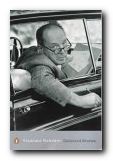a critical examination of Nabokov’s collected stories
 ‘Recruiting’ (July 1935) starts off as if it is offering yet another character sketch from émigré life, but in the end it turns out to be concerned with the joys of literary composition. Vasily Ivanovich is a tired old Russian émigré who has lost all his relatives and is now desperately poor, having ‘reached the point where a man no longer asks himself on what he will live tomorrow, but merely wonders what he had lived on the day before’ (TD,p.103).
‘Recruiting’ (July 1935) starts off as if it is offering yet another character sketch from émigré life, but in the end it turns out to be concerned with the joys of literary composition. Vasily Ivanovich is a tired old Russian émigré who has lost all his relatives and is now desperately poor, having ‘reached the point where a man no longer asks himself on what he will live tomorrow, but merely wonders what he had lived on the day before’ (TD,p.103).
His beloved sister is dead, and on the day of the story he has visited her grave whilst at the burial of another émigré, Professor D. The story switches from third to first person mode to describe a curious sense of spiritual uplift he nevertheless feels whilst viewing the world around him as he sits in a public garden enjoying the sunshine:
‘A wet red hose lay across the entire lawn in the centre of the … garden and, a little way off, radiant water gushed from it, with a ghostly iridescence in the aura of its spray’ (p.107)
A man with a newspaper comes to sit beside him on the bench and reveals that what we have so far learned so far is in fact his own speculation about Vasily, and that he might not even be Russian at all. This suddenly-appearing narrator tells us that Vasily’s sister has been assembled out of the details of someone else, and that both these sketches have been created to fill spaces in a novel on which he has been working.
The narrator then indulges in one of those speculations regarding the relationship between one level of fictionality and another which can make readers feel that they are being asked to turn their own minds inside-out:
‘I felt I was infecting that stranger with the blazing creative happiness that sends a chill over an artist’s skin … [and that happiness ought to] be accessible to two people at least, becoming their topic of conversation and thus acquiring rights to routine existence’ (p.109)
Before the narrator can speak with this man onto whom he has projected his own wellbeing, Vasily gets up from the bench and walks away. But the narrator feels that he has anyway captured his character forever for his own literary purposes, and he tells us that the man will appear in a future chapter of his novel.
But then another narrator steps into the story, reducing the inner narrator to “my representative, the man with the Russian newspaper” (p.110) and reveals that we have not two but three levels of fictionality.
It would be misleading to dwell too much on parallels between two writers so dissimilar as Nabokov and Virginia Woolf, but ‘Recruiting’ is remarkably similar to An Unwritten Novel which deals with this subject of imagined lives and their imprecise connexion with a ‘true identity’ which is itself fictional. In the light of the fictions-within-fictions which have become such a tiresome cliché of postmodernism, it is worth noting that although this sudden appearance of a hitherto concealed outer narrator is something of a trick against which the reader has no defence, Nabokov only uses the device once (rather like his acrostic at the end of The Vane Sisters).
And is the story merely a trick? Well – no, because it is in the end designed to create a character, whether his name is Vasily or not, who carries his émigré status, his age, and his poverty with a certain amount of dignity and pride. He is another actor in the large cast of Nabokov’s record of the emigration, and if he is produced via a certain amount of literary sleight of hand, he lives nonetheless for that.
© Roy Johnson 2005
![]() Vladimir Nabokov: The Collected Stories – Amazon UK
Vladimir Nabokov: The Collected Stories – Amazon UK
![]() Vladimir Nabokov: The Collected Stories – Amazon US
Vladimir Nabokov: The Collected Stories – Amazon US
Vladimir Nabokov web links
Vladimir Nabokov greatest works
Vladimir Nabokov criticism
Vladimir Nabokov life and works